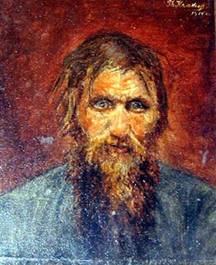SAINTS, MYSTICS AND VILLAINS OF PETERSBURG
MYSTICAL PETERSBURG
Rasputin
Rasputin and khlisty

Russian religiousness always was famous for barefaced passion and feelings turned upside down . Extravagance of ritual always was of great importance for Russians. And predilection to loose, drunk shabashes behind which necessary all-consuming and painful repentance came, was frequently inaccessible to the western mentality.
There are many certificates of contemporaries that they have been convinced, as if Rasputin was a khlist. Researchers have found out that fellow villagers considered Rasputin as a member of this sect.
When hearings about it have reached the rural priest, that has reported on them on the Tobolsk archbishop. Even his daughter Matryona writes about membership of the father in sect of khlists as about the fact. However to prove it documentary it was not possible. The reason of it, apparently, first of all that the sect of khlists has been forbidden also its members operated secretly in order to avoid prosecution.
In the presence of strangers khlists behaved as approximate orthodox, assiduously prayed, executed ceremonies, repentances and communicatings, observed posts.
What represented khlists and whence they undertook? For the first time they have appeared in Russia simultaneously with the ' separated ' colleagues, Skoptsami, or ' eunuchs ' (approximately in 1500).
They learnt that in each person there is a small spark of divine. They believed that in each person it is enough simple comprehension of this magic essence to release it from any restrictions, - social, sexual and intellectual.
Their ritual, at it heart - originally Russian, comprised some foreign loans. They esteemed on names and acts of pre-Christian mythological beings, such as mermaids, house-ghosts, worshipped to ancient god Jarile, a passion and desire embodiment.
Khlists also addressed to bible gods of pleasure, for example, to such dark, terrible demons as Valaam, to the Persian gods, in particular to Hors. In ritual of these ' voluptuaries ' spinning and round dances which the violent exit of sexual energy followed, were almost indistinguishable from ecstatic dances of Whirling Dervishs.
Meetings of members of a territorial community for the general prayer which were called "radeniya" were the basic form of khlists communication. These prayers were accompanied by general dancing in which process khlists reached religious ecstasy.
Their dogma 'repentances through a sin' - the assumption was undoubtedly, strongest proof of influence of foreign sects on khlists that physical copulation with ' divine ' or selected (in what god lived or the flame of god) will release the person from a sin and will transform a sin to the benefactor.
All principal views of the sect, most likely, Grigory Rasputin has accepted and stated. In particular, he has stated to their teacher and the psalm reader.
Source: Nikolay Kozlov "In memory of the aged man"